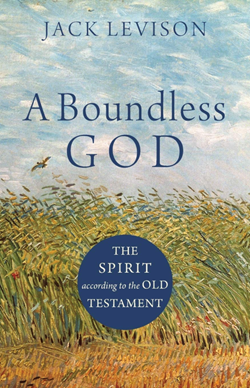Boundless Spirit: A "Ruach"-ology

No one – and that’s not even close to an overstatement – has pressed for Bible readers to think more acutely about “Spirit” or “spirit” or “wind” or “breath” in the first half of the Bible than Jack Levison. His newest book on Spirit/spirit is called A Boundless God and he means for us to think in terms of God’s Spirit and our spirit in an integrated relationship that … well… smashes boundaries and opens up new considerations.
Jack Levison is one of the best “writers” in the whole guild of biblical scholars. His prose is clear and elegant and avoids the mundane. Read him for his prose, I sometimes tell students.
This book, which will be a series on this blog, begins by pressing home this: when compared to other very important terms in the “Old” Testament (covenant, lovingkindness, peace, Law, glory, sabbath, blessing), ruach or spirit/Spirit occurs the most (389x to be exact).
It deserves more consideration. Jack’s right. What the OT, what the Hebrew Bible – what the First Testament says about the Spirit/spirit (ruach) deserves our attention.
So we will give it that in this series.

Furthermore, what does ruach mean? This, too, presents a problem: Christians – I’m one of them – get to reading OT ruach in terms of NT Spirit, and the next thing we have a full blown “pneumatology” in the OT.
Except that the OT doesn’t have that. We are stretching the skin of the NT fox over the realities of the OT.
Which is the problem, too: what does this term mean? Does it mean Spirit, does it mean human spirit, does it mean wind, does it mean breath? Yes, and more.
Often Christians ask Which of these texts is about the Holy Spirit, the 3d person of the Trinity? Which is about the divine Spirit? And did the OT have a pneumatology as such so that we can say OT covenant believers were “filled” with the Spirit? Or did that happen only in the NT? All these questions, however, run aground in the OT itself because it’s not doing what the NT is doing… and we have much to learn from these facts alone.
What we need, Levison is arguing over and over in his books, is a “ruach”-ology that matches our NT and systematic “pneumatology.”
Instead of adjudicating which texts are more Christians and which ones aren’t, and whether or not the Spirit indwellt OT covenant believers or not, Levison studies the verbs about the Spirit:
- Blowing and breathing
- Coming upon
- Resting upon
- Passed on
- Poured out
- Filling
- Cleansing
- Standing and Guiding
Then he explores in his conclusion just how “beyond” the OT ruach is and that, he is saying, is something for Christians to start thinking about.
Which we will.
Jesus Creed is a part of CT's
Blog Forum. Support the work of CT.
Subscribe and get one year free.
The views of the blogger do not necessarily reflect those of Christianity Today.


















